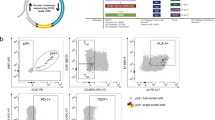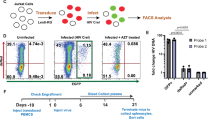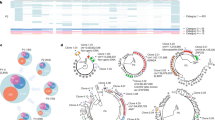Abstract
The alteration of T lymphocyte functions as a consequence of human immunodeficiency virus (HIV) infection is a potential target for the genetic treatment of the acquired immunodeficiency syndrome (AIDS). One approach to the gene therapy for AIDS is to block the replication of HIV-1. Tat-dependent expression of forein gene and selective infection of CD4(+) cells by retroviral vector might be useful for abrogating the production of HIV-1 from cells. As part of studies to examine the feasibility of this concept, I constructed tat(+) and tat(-) HIV-1 proviral vectors that express all HIV-1 genes except for env and/or tat gene. When tat(+) or tat(-) HIV-1 particles were used for infection of HeLa T4 cells containing the endogenous β-galactosidase (lacZ) gene under the control of the HIV-1 promoter and transactivation response element sequences, only the tat(+) HIV-1 particles transactivated the lacZ gene expression. This activation of lacZ expression following HIV infection of Tat(-) cells that stably contained but did not express the lacZ construct was determined to be an efficient process. I also constructed simple HIV-1 vectors that express the lacZ gene in a Tat-dependent manner or the hygromycin B phosphostransferase gene (Hyg(r)) under the control of the SV40 early promoter. The Tat-dependent vector conferring the lacZ(+) phenotype was assayed by β-gal staining after infection of Tat(+) or Tat(-) cells. The activation of lacZ expression was observed only in tat(+) cells. Another simple HIV-1 vector containing the Hyg(r) gene was used for retroviral production from HeLa cells expressing the HIV-1 env gene and infection of CD4(+) or CD4(-) cells, but Hyg(r) colony was observed only from CD4(+) cells. These results provide a rationale for the use of HIV-1 retroviral vector system in the design of gene therapy of HIV infection.
Similar content being viewed by others
Article PDF
Author information
Authors and Affiliations
Rights and permissions
This is an Open Access article distributed under the terms of the Creative Commons Attribution Non-Commercial License (http://creativecommons.org/licenses/by-nc/3.0/) which permits unrestricted non-commercial use, distribution, and reproduction in any medium, provided the original work is properly cited.
About this article
Cite this article
Kim, YS. A simple human immunodeficiency virus vector system for selective infection of CD4(+) cells and inducible expression of foreign genes. Exp Mol Med 29, 103–110 (1997). https://doi.org/10.1038/emm.1997.15
Published:
Issue date:
DOI: https://doi.org/10.1038/emm.1997.15



